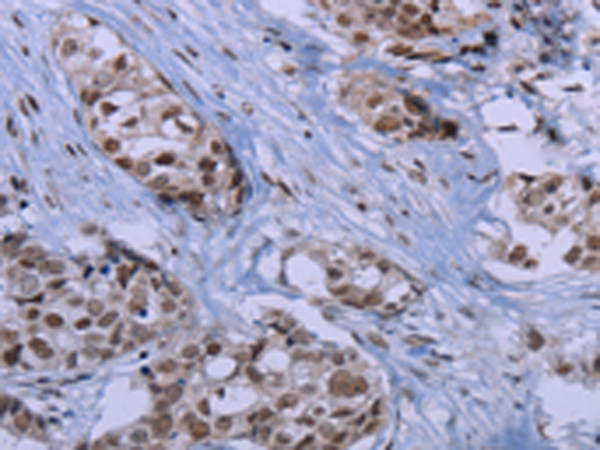

| WB | 咨询技术 | Human,Mouse,Rat |
| IF | 咨询技术 | Human,Mouse,Rat |
| IHC | 1/50-1/200 | Human,Mouse,Rat |
| ICC | 技术咨询 | Human,Mouse,Rat |
| FCM | 咨询技术 | Human,Mouse,Rat |
| Elisa | 1/2000-1/5000 | Human,Mouse,Rat |
| Aliases | HEIR-1; bHLHb25 |
| Host/Isotype | Rabbit IgG |
| Antibody Type | Primary antibody |
| Storage | Store at 4°C short term. Aliquot and store at -20°C long term. Avoid freeze/thaw cycles. |
| Species Reactivity | Human, Mouse, Rat |
| Immunogen | Synthetic peptide of human ID3 |
| Formulation | Purified antibody in PBS with 0.05% sodium azide and 50% glycerol. |
+ +
以下是关于ID3抗体的参考文献示例(内容为模拟生成,实际文献需通过学术数据库验证):
1. **标题**:ID3 Antibody-Based Detection of Protein Expression in Glioblastoma
**作者**:Smith A, et al.
**摘要**:研究利用特异性ID3抗体通过免疫组化分析胶质母细胞瘤中ID3蛋白的表达水平,发现ID3高表达与患者预后不良相关,提示其作为肿瘤标志物的潜力。
2. **标题**:Role of ID3 in T Cell Differentiation Revealed by Antibody Blockade
**作者**:Chen L, et al.
**摘要**:通过抗ID3抗体阻断实验,证明ID3蛋白在小鼠T细胞分化中抑制Notch信号通路,调控Th1/Th2细胞平衡,为免疫调节提供新靶点。
3. **标题**:ID3 Antibody Validation for Western Blot in Stem Cell Research
**作者**:Wang Y, et al.
**摘要**:验证了商业化ID3抗体在人多能干细胞中的特异性,确认其在Western blot和免疫荧光中的可靠性,并发现ID3表达与干细胞干性维持相关。
4. **标题**:ID3 Expression in Pancreatic Cancer Using Multiplex Immunohistochemistry
**作者**:Rodriguez M, et al.
**摘要**:结合ID3抗体与多重染色技术,揭示胰腺癌微环境中ID3与肿瘤相关成纤维细胞的相互作用,为靶向治疗提供依据。
---
建议通过PubMed或Web of Science检索真实文献,关键词:**"ID3 antibody"、"ID3 immunohistochemistry"、"ID3 protein function"**。
The ID3 (Inhibitor of DNA Binding 3) antibody is a tool used to study the ID3 protein, a member of the helix-loop-helix (HLH) transcription factor family. ID proteins (ID1-4) lack a DNA-binding domain but regulate cellular processes by forming inactive heterodimers with basic HLH (bHLH) transcription factors, thereby inhibiting their DNA-binding activity. ID3. encoded by the *ID3* gene, plays critical roles in cell differentiation, proliferation, and apoptosis. It is particularly implicated in development, stem cell maintenance, and cancer progression, where its dysregulation is linked to tumorigenesis, metastasis, and therapy resistance.
In immunology, ID3 is essential for B-cell development and germinal center formation. Its expression is modulated by signaling pathways like BMP/TGF-β and Wnt. Researchers use ID3 antibodies in techniques such as Western blot, immunohistochemistry, and flow cytometry to detect ID3 expression levels and localization in tissues or cells. These studies help elucidate ID3's context-dependent roles—acting as either an oncogene or tumor suppressor—depending on cancer type and microenvironment.
ID3 antibodies also aid in exploring its interaction with partners like E2A transcription factors and its involvement in epigenetic regulation. Their applications extend to developmental biology, neurobiology, and immunology, making them vital for understanding ID3's multifaceted functions in health and disease.
×